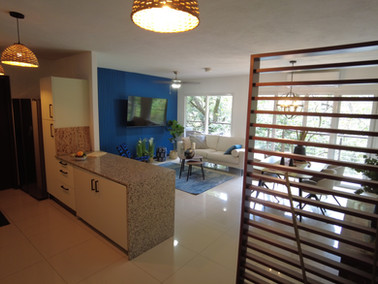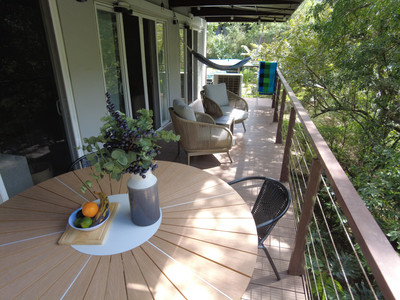Nomads or Fauxmads - Part Two (Money)
- B&B

- Apr 21, 2025
- 3 min read
I’ve written before about our grand plan to retire as Jack Reacher-style nomads—owning nothing but our debit cards, toothbrushes, and the clothes on our backs, wandering the world (minus the beating up bad guys part, which, let’s be honest, was always a stretch). But that fantasy hit a snag when I realized I crave a permanent home base. The idea of putting down even shallow roots came from my need for peace of mind—a place to call my own. But with our ambitious travel plans, would buying a home actually make financial sense?

Barbara and I were incredibly fortunate to sell our U.S. home in a strong seller’s market. Thirteen years ago, we bought a charming one-bedroom on a freshwater pond in Greenville, Rhode Island, with a hefty down payment and a 15-year mortgage that was nearly paid off. The sale left us with a good chunk of cash equity. While we could have easily bought a big, stunning home in Costa Rica for that amount, we tried to stay rational. Using a 5% annual return as our benchmark, we weighed whether a home purchase was worth what we’d be giving up in investment income.
Instead, we decided to commit no more than half of our “housing bucket” to a purchase weighed against what we’d otherwise pay in rent. (Finance nerds: Yes, I’m ignoring taxes on investment returns and the nuances of deferred rent expense, because that’s a rabbit hole I don’t want to go down.)
Here’s how we broke it down:
Renting a place we love almost anywhere in the world (excluding hot, humid Southeast Asia—no thanks!) would cost about $1,200/month. Housing is scarce globally, so we expect those costs to rise.
Property values in desirable expat and retiree destinations are also climbing. Locking in a home at a price we can afford now seemed wise.
We’re not banking on our Costa Rican real estate appreciating or depreciating much. This isn’t a growth investment for us.
We hoped to get some value from the property when we’re away. Airbnb was an option, but we found something better.
Upkeep costs are minimal—about $250-$300/month for utilities, condo fees, insurance, and taxes.
Our place in Costa Rica, with a balcony in the jungle canopy. Quite amazing.
We bought a two-bedroom, two-bath condo in the San Nicolas de Bari development in Santa Ana. After closing costs, legal fees, and furnishing, our total investment was about half of our home sale equity. This year, we’ll live there for 21 weeks (about five months) and travel for 31 weeks (about seven months). Factoring in about $10,000 in lost investment income and $300/month in maintenance, our condo costs us about $13,000 a year, or $1,085/month. Of course, we still pay for accommodations while traveling—anywhere from $1,200/month for a long Airbnb stay to much more when we’re “fast traveling.”
For now, we’ve chosen not to rent out our apartment on Airbnb. Managing it from afar isn’t worth the hassle, and based on neighbors’ experiences, we’d net less than $1,000/month at 70% occupancy. Instead, we joined Home Exchange, which works like a time-share platform. We earn guest points when others stay in our apartment, which we can then use for our own stays. This year, we’ve used points for short stays in Dubrovnik, Zurich, and San Francisco. Given current hotel rates (Zurich tops the charts as the world’s most expensive city), we’ve already “earned” $3,750 by letting others use our place while we’re away. Our apartment is in high demand, so we expect to double that value with future exchanges. (If you are interested in joining Home Exchange, here's our referral link for you to use.)
The cold, hard truth? We’d spend a bit less on housing if we fully embraced the Jack Reacher lifestyle. So how do we justify the expense for the peace of mind that comes with having a home base? Honestly, we don’t need to—peace of mind is priceless.
In Part Three of “Nomads or Fauxmads,” I’ll dive deeper into the psychological and spiritual benefits of being just a little bit grounded while globetrotting.












Comments